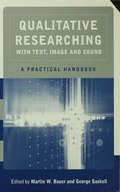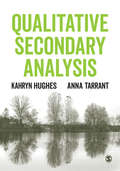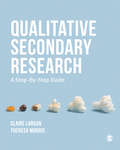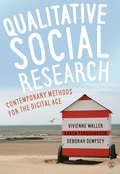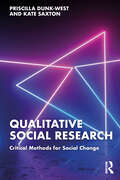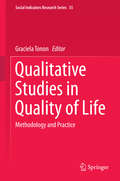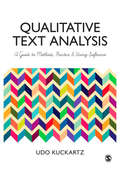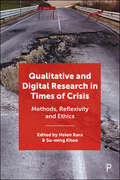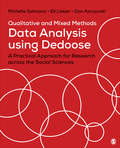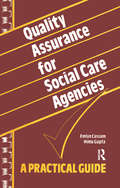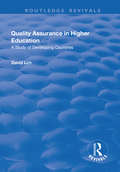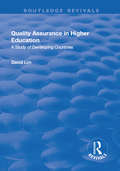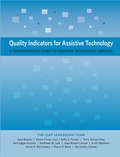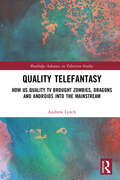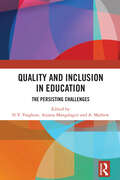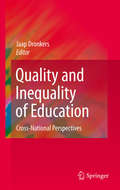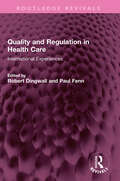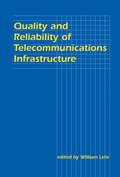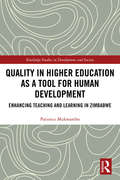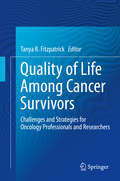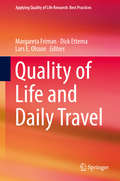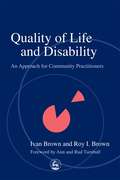- Table View
- List View
Qualitative Researching with Text, Image and Sound: A Practical Handbook for Social Research
by Dr Martin W Bauer Dr George D. Gaskell`This excellent text will introduce advanced students - and remind senior researchers - of the availability of a broad range of techniques available for the systematic analysis of social data that is not numeric. It makes the key point that neither quantitative nor qualitative methods are interpretive and at the same time demonstrates once and for all that neither a constructivist perspective nor a qualitative approach needs to imply abandonment of rigor. That the chapters are written by different authors makes possible a depth of expertise within each that is unusually strong' - Susanna Hornig Priest, Texas A&M University; Author of `Doing Media Research' Qualitative Researching with Text, Image and Sound offers a unique resource for today's social researcher. This practical handbook provides a comprehensive and accessible introduction to a broad range of research methods with the objective of clarifying procedures, good practice and public accountability. Following an introduction which discusses quality and quantity, and how these relate to issues of representation and knowledge interests in social research, the book is organized into four parts: · Part I covers different ways of collecting data and different types of data relating to text, image and sound: corpus construction, individual and group interviewing, narrative and episodic interviewing, video and film, and bemetology. · Part II introduces the main analytic approaches for text, image and sound: classical content analysis, argumentation, discourse, conversation analysis, rhetoric, semiotics, analysis of moving images, and of noise and music - each includes an introduction with examples and step-by-step advice on how to do it. · Part III covers computer-assisted analysis - including computer-assisted qualitative data analysis and key-word-in-context analysis. · Part IV addresses issues of good practice, looking at problems and fallacies in interpretation and develops quality criteria for qualitative research. This book provides researchers with the skills and knowledge to make the appropriate choices between different methods, types of data, and analytic procedures, and gives examples and criteria of good practice for each one. It will be essential reading for students and researchers across the social sciences.
Qualitative Secondary Analysis
by Kahryn Hughes Anna TarrantA comprehensive guide to carrying out Qualitative Secondary Analysis (QSA) that brings together expert advice and professional insight from leading researchers who have developed innovative theories and methods of QSA. Exploring crucial components of research and analysis—such as where to find resources, how to search within a resource, and working with both paper archives and non-textual data—each chapter offers insightful case studies, links to further reading and applied helpful hints and tips to help effectively apply these innovations to further the reader’s own research. A must read for Social Science students, early career researchers and researchers new to the field of QSA, this text will help readers through every aspect of a research process using QSA, from application to implications.
Qualitative Secondary Research: A Step-By-Step Guide
by Claire Largan Theresa M. MorrisUsing secondary data offers unique opportunities and challenges. This practical book will guide you through finding, managing and analysing qualitative secondary data in an error-free way. Perfect for those doing dissertations and research projects, it provides an accessible introduction to the theory of secondary research and sets out the advantages and limitations of using this kind of research. Drawing on years of teaching and research experience, the authors · Offer step-by-step advice on how to use qualitative secondary data · Walk you through each stage of the research process · Provide practical, ethical tools to help you with your project · Show you how to avoid the potential pitfalls of using secondary data. Clear and easy to understand, this book is a ready-made toolkit for successfully using qualitative secondary data. From beginner level and beyond, this no-nonsense guide takes the confusion and worry out of doing a secondary research project.
Qualitative Secondary Research: A Step-By-Step Guide
by Dr. Claire Largan Dr. Theresa M. MorrisUsing secondary data offers unique opportunities and challenges. This practical book will guide you through finding, managing and analysing qualitative secondary data in an error-free way. Perfect for those doing dissertations and research projects, it provides an accessible introduction to the theory of secondary research and sets out the advantages and limitations of using this kind of research. Drawing on years of teaching and research experience, the authors · Offer step-by-step advice on how to use qualitative secondary data · Walk you through each stage of the research process · Provide practical, ethical tools to help you with your project · Show you how to avoid the potential pitfalls of using secondary data. Clear and easy to understand, this book is a ready-made toolkit for successfully using qualitative secondary data. From beginner level and beyond, this no-nonsense guide takes the confusion and worry out of doing a secondary research project.
Qualitative Social Research: Contemporary Methods for the Digital Age
by Karen Farquharson Dr Deborah Dempsey Vivienne WallerQualitative Social Research employs an accessible approach to present the multiple ways in which criticism enhances research practice. Packed full of relevant, 'real world' examples, it showcases the strengths and pitfalls of each research method, integrating the philosophical groundings of qualitative research with thoughtful overviews of a range of commonly used methods. This book is ideal for students and prospective researchers and explains what makes qualitative sociological research practical, useful and ethical. It’s an essential guide to how to undertake research, use an appropriate research design and work with a range of qualitative data collection methods, and includes: detailed discussions of ethical issues references to new technologies in each chapter explanations of how to integrate online and visual methods with traditional data collection methods exercises to enhance learning The authors use their many years’ experience in using a range of qualitative methods to conduct and teach research to demonstrate the value of critical thinking skills at all stages of the research process.
Qualitative Social Research: Contemporary Methods for the Digital Age
by Karen Farquharson Dr Deborah Dempsey Vivienne WallerQualitative Social Research employs an accessible approach to present the multiple ways in which criticism enhances research practice. Packed full of relevant, 'real world' examples, it showcases the strengths and pitfalls of each research method, integrating the philosophical groundings of qualitative research with thoughtful overviews of a range of commonly used methods. This book is ideal for students and prospective researchers and explains what makes qualitative sociological research practical, useful and ethical. It's an essential guide to how to undertake research, use an appropriate research design and work with a range of qualitative data collection methods, and includes: detailed discussions of ethical issues references to new technologies in each chapter explanations of how to integrate online and visual methods with traditional data collection methods exercises to enhance learning The authors use their many years' experience in using a range of qualitative methods to conduct and teach research to demonstrate the value of critical thinking skills at all stages of the research process.
Qualitative Social Research: Critical Methods for Social Change
by Priscilla Dunk-West Kate SaxtonThis text provides an easy-to-read introduction to qualitative research methods in social work, taking into account contemporary contexts and social conditions.Drawing from a range of social work perspectives, it allows the reader to make the connection between social work values, theory and specific research methods and approaches.Comprised of 11 chapters, it covers overarching epistemological perspectives and knowledge construction; designing a research question; research design and methods; data collection and analysis; research ethics and dissemination; and impact and research translation. Highlighting social work’s unique commitment to social justice, it positions social work research as embedded in the profession’s values.As the first book to comprehensively connect social work values and emancipatory frameworks, including decolonising practices, with research methods, it shows readers the connection between social work theory and choices in relation to ethical research design.This book is suitable for use on all BSW and MSW research modules across Australia and New Zealand as well as social work courses across the UK.
Qualitative Studies in Quality of Life
by Graciela TononThis volume explores the use and relevance of qualitative methods for the study of quality of life. It analyzes the role of qualitative researcher and the role of the context and the culture in quality of life studies. It presents the use of qualitative methods in real projects carried out in specific fields: geography, health, community studies, labor life and yoga. Finally, the book proposes the use of mixed methods that are considered as the third methodological approach in social research. The main purpose of using qualitative methods is to understand what it means for participants to be involved in certain events, situations and actions. Such methods help understand the context in which participants act and the influence of that context on their actions. The decision to use a particular methodology implies a philosophic, theoretical and political decision. Qualitative methodology constitutes an approach that is essential for understanding people's experiences of well-being and discovering new issues related to quality of life.
Qualitative Text Analysis: A Guide to Methods, Practice and Using Software
by Dr Udo KuckartzHow can you analyse narratives, interviews, field notes, or focus group data? Qualitative text analysis is ideal for these types of data and this textbook provides a hands-on introduction to the method and its theoretical underpinnings. It offers step-by-step instructions for implementing the three principal types of qualitative text analysis: thematic, evaluative, and type-building. Special attention is paid to how to present your results and use qualitative data analysis software packages, which are highly recommended for use in combination with qualitative text analysis since they allow for fast, reliable, and more accurate analysis. The book shows in detail how to use software, from transcribing the verbal data to presenting and visualizing the results. The book is intended for Master's and Doctoral students across the social sciences and for all researchers concerned with the systematic analysis of texts of any kind.
Qualitative and Digital Research in Times of Crisis: Methods, Reflexivity, and Ethics
by Helen Kara and Su-ming KhooCrises such as the COVID-19 pandemic, disasters, or violent conflict present numerous challenges for researchers. Faced with disruption, obstacles, and even danger to their own lives, researchers in times of crisis must adapt or redesign existing research methods in order to continue their work effectively. Including contributions on qualitative and digital research from Europe, Asia, Africa, Australasia, and the Americas, this volume explores the creative and thoughtful ways in which researchers have adapted methods and rethought relationships in response to challenges arising from crises. Their collective reflections, strategies, and practices highlight the importance of responsive, ethical, and creative research design and the need to develop methods for fostering mutual, reflexive, and healthy relationships in times of crisis.
Qualitative and Mixed Methods Data Analysis Using Dedoose: A Practical Approach for Research Across the Social Sciences
by Dan Kaczynski Michelle Salmona Eli LieberQualitative and Mixed Methods Data Analysis Using Dedoose®: A Practical Approach for Research Across the Social Sciences by Michelle Salmona, Eli Lieber, Dan Kaczynski provides both new and experienced researchers with a guided introduction to dealing with the methodological complexity of mixed methods and qualitative inquiry using Dedoose® software. The authors use their depth of experience designing and updating Dedoose® as well as their published research to give the reader practical strategies for using Dedoose® from a wide range of research studies. Case study contributions by outside researchers provide readers with rich examples of how to use Dedoose® in practical, applied social science and health settings.
Qualitative and Mixed Methods Data Analysis Using Dedoose: A Practical Approach for Research Across the Social Sciences
by Dan Kaczynski Michelle Salmona Eli LieberQualitative and Mixed Methods Data Analysis Using Dedoose®: A Practical Approach for Research Across the Social Sciences by Michelle Salmona, Eli Lieber, Dan Kaczynski provides both new and experienced researchers with a guided introduction to dealing with the methodological complexity of mixed methods and qualitative inquiry using Dedoose® software. The authors use their depth of experience designing and updating Dedoose® as well as their published research to give the reader practical strategies for using Dedoose® from a wide range of research studies. Case study contributions by outside researchers provide readers with rich examples of how to use Dedoose® in practical, applied social science and health settings.
Quality Assurance for Social Care Agencies: A Practical Guide
by Emlyn Cassam Himu GuptaQuality Assurance for Social Care Agencies is specifically designed to enable you to set up a Quality Assurance system within a social services setting. Including practical checklists, it covers all aspects of Quality Assurance - from what is meant by Quality Assurance and how to implement it to how to monitor and maintain quality control. Examples and details of experiences are included to help you get it right first time.
Quality Assurance in Higher Education: A Study of Developing Countries (Routledge Revivals Ser.)
by David LimThis title was first published in 2001. Universities in developing countries have followed their counterparts in developed countries and adopted quality assurance to improve the quality of their activities. This text examines the wisdom of such a move when many of the conditions necessary for its success are not present. It concludes that quality assurance can be useful in developing countries because it shows how a university's seemingly disparate activities are related to one another to serve a common goal and how the quality of these can best be improved by using an integrated approach. Quality assurance also provides more focus and direction to the work of the traditional university system. However, it must be modified to suit the conditions prevailing in developing countries by being simple in design, modest in expectations and realistic in requirements.
Quality Assurance in Higher Education: A Study of Developing Countries (Routledge Revivals)
by David LimThis title was first published in 2001. Universities in developing countries have followed their counterparts in developed countries and adopted quality assurance to improve the quality of their activities. This text examines the wisdom of such a move when many of the conditions necessary for its success are not present. It concludes that quality assurance can be useful in developing countries because it shows how a university's seemingly disparate activities are related to one another to serve a common goal and how the quality of these can best be improved by using an integrated approach. Quality assurance also provides more focus and direction to the work of the traditional university system. However, it must be modified to suit the conditions prevailing in developing countries by being simple in design, modest in expectations and realistic in requirements.
Quality Indicators for Assistive Technology: A Comprehensive Guide to Assistive Technology Services
by Susan Mccloskey Diana Foster Carl Gayl Bowser Jane Edgar Korsten Joan Breslin Larson Joy Smiley Zabala Kathleen Lalk Kelly Fonner Penny Reed Scott Marfilius Terry Vernon FossMore than 6 million children with disabilities in North America require assistive technology and related services each year in order to participate and succeed in school. This book, Quality Indicators for Assistive Technology, provides an essential guide for assessing a child's needs, choosing and implementing the right technologies and services, and training education professionals in how to optimize learning with these critical tools.
Quality Telefantasy: How US Quality TV Brought Zombies, Dragons and Androids into the Mainstream (Routledge Advances in Television Studies)
by Andrew LynchThis book explores the relatively new genre of ‘Quality Telefantasy’ and how it has broadened TV taste cultures by legitimating and mainstreaming fantastical content. It also shows how the rising popularity of this genre marks a distinct and significant development in what kinds of TV are culturally dominant and critically regarded. By expanding and building on the definition of US Quality TV, this book brings together a number of popular science fiction, fantasy and horror TV series, including Game of Thrones, The Walking Dead and Westworld, as case studies which demonstrate the emergence of the Quality Telefantasy genre. It looks at the role of technology, including internet recap culture and subscription video on demand distribution, in Quality Telefantasy’s swift emergence, and analyses its success internationally by considering series created outside the US like Kingdom (South Korea, Netflix) and Dark (Germany, Netflix). The book argues that Quality Telefantasy series should be considered a part of the larger Quality TV super-genre, and that the impact they are having on the global TV landscape warrants further investigation as it continues to evolve. This is a valuable text for students and scholars studying or undertaking research in the areas of television studies, new media and pop-cultural studies.
Quality and Inclusion in Education: The Persisting Challenges
by N. V. Varghese Anjana Mangalagiri A. MathewThis book calls for an equitable and qualitative access to education for all. It proposes paradigms of educational governance that are based on coalition building between key stakeholders, are grounded in local and cultural contexts, sensitive to the language needs of communities. It underlines the significance of gender sensitive and inclusive approaches that ensure equity for marginalized children and minorities. Based on research-based studies, the volume focuses on equity, quality, and learning — covering a broad spectrum, from school to higher, to adult education. It discusses the multiple learner deprivations amongst the marginalized communities and the severe impact of events such as pandemics that exacerbate learner inequities and the recent developments in India under the National Education Policy 2020. It also presents research-based country experiences in the Asian (India, Bangladesh, China) and African (Ghana, South Africa) contexts, showing how external influences on the changing priorities in policy perspectives cut across developing countries. Compiled in honour of Professor R. Govinda, this volume of insightful articles will be of interest to students and researchers of educational policy and studies, sociology of education, equity and human rights. It will also be useful for decision makers and think tanks.
Quality and Inequality of Education
by Jaap DronkersThis cogent analysis of data on education and society from a variety of sources sets out to provide answers to scientific and policy questions on the quality of education and the way it relates to various forms of inequality in modern societies, particularly in Europe. The authors examine not only the well known cross-national PISA datasets, but also the European Social Survey and TIMSS, going further than many researchers by folding into their analyses economic, legal and historical factors. Most research up to now using the PISA data is restricted to educational research. Interesting as that educational question is, the chapters here use the PISA, and other data, to explore more profoundly the relationship between education and the various forms of inequality in European and other modern societies. The work comes from two different perspectives: one that looks at how the different characteristics of societies, their economies, and their educational systems influence the average educational achievements of specific groups of pupils, such as immigrants, in those societies; and a second, which explores how, and in what degree, the characteristics of schools, educational systems and labour-markets either hardens or softens differences in the educational outcomes of various groups of pupils. With a special feature of the book being its emphasis on comparing Asian and European countries, and with the content free of the political constraints that can often attend studies of these datasets, this book will be an vital resource for educationalists and policy-makers alike.
Quality and Regulation in Health Care: International Experiences (Routledge Revivals)
by Robert Dingwall Paul FennFirst published in 1992, Quality and Regulation in Health Care employs socio-legal ideas concerning regulation to examine the methods used to influence the quality of health care in the US, UK, and Western Europe. Throughout the Western world, health care systems, both public and private, are grappling with the problems of assuring quality while containing costs. On the one hand, governments and insurers argue that there must be some limit to the apparently endless growth of health care expenditures. On the other, patient groups and consumer advocates, already dissatisfied by the problems in holding doctors accountable for their actions, protest that such limits must not result in sick people getting inferior treatment. This book examines in detail the debate surrounding the question: How can the professional expertise of the clinicians be reconciled with the preferences of their patients and the economic concerns of taxpayers or insurers? It will be essential reading for graduate and undergraduate courses in health policy, medical sociology, and health law.
Quality and Reliability of Telecommunications Infrastructure: Quality And Reliability Of Telecommunications Infrastructure (LEA Telecommunications Series)
by William LehrIn the last decade, the technology, regulation, and industry structure of our information infrastructure (telephone services, cable and broadcast television, and myriad new data and information services) have changed dramatically. Since the break-up of AT&T's Bell System monopoly, telephone services in the United States are no longer purchased from a single firm. Advances in fiber optics, wireless communications and software-controlled switching are changing how communication services are provided. As the global economy grows more dependent on a hybrid mix of interconnected networks, public officials in the US and abroad are relinquishing control of the market. All of these changes are affecting the quality and reliability of the telecommunications infrastructure, but informed discussions of the public policy and economic issues are scarce. Deregulation and increased competition have lowered prices, but have service quality and reliability suffered? Do advanced network technologies which make it possible to offer a dizzying array of new services increase vulnerability to system-wide failures? Who should or is likely to bear the costs of increased -- or decreased -- service quality? This volume tackles the economic and public policy issues raised by these difficult questions for an audience of industry executives, scholars, and policymakers. Leading scholars and analysts examine such issues as the effects of network ownership on incentives to invest in quality improvements and/or strategies for quality-differentiated pricing in tomorrow's broadband, integrated networks. They analyze the quality of current telecommunications networks and the impact of re-regulation on cable television quality. The contributions range from new microeconomic theory to new empirical research. As such, the volume makes a valuable contribution to the public debate on network quality and reliability. It will be useful both as an introduction to newcomers and as a resource for more experienced researchers. As regulatory, industry and national barriers to integrated communications fall, these issues are likely to become even more important. The research presented here provides a solid foundation for further discussion.
Quality in Higher Education as a Tool for Human Development: Enhancing Teaching and Learning in Zimbabwe (Routledge Studies in Development and Society)
by Patience MukwamboWhilst many studies have explored how quality in higher education is conceptualised in the Global North, less attention has been paid to quality in higher education in Africa and the Global South. This book uses the human development and capabilities approach to demonstrate how quality in teaching and learning contributes to a range of benefits, such as improved wellbeing, economic outcomes, political engagement, and human capital formation amongst graduates. The book interrogates the various dimensions of quality as well as factors that impact on the realisation of quality in universities and society at large. Recognising that measures of quality are context and stakeholder specific, the book uses the Zimbabwean context as a Global South case study. It evaluates how quality is conceptualised and operationalised in Zimbabwean universities, and how that impacts on teaching and learning policy and practice. The book also demonstrates the need for economic resources for individuals and universities, and emphasises the importance of a social and educational environment conducive to critical learning, and post-university opportunities. This book will be of interest to researchers across Education, African and Development Studies, as well as to policymakers and practitioners with an interest in quality assurance and the promotion of teaching and learning in universities in the Global South.
Quality of Life Among Cancer Survivors
by Tanya R. FitzpatrickThis multidisciplinary reference explores the concepts and realities of quality of life among cancer survivors in its physical, psychological, cognitive, social, and familial dimensions. Informed by a broad range of fields including genetics, psychiatry, nursing, dentistry, rehabilitation, and ethics, it addresses daily challenges of living for this population, from self-care to cultural concerns and from social interactions to experiences with providers. Family issues of pediatric, young adult, and elder survivors, caregiving parents, and siblings are a major area of concern. And contributors describe interventions for survivors as individuals, in family content, and as part of integrated care across primary and specialty settings. Included among the topics: Play, leisure activities, and cognitive health among older cancer survivors. Genetic mutations in cancer susceptibility genes: a family history of cancer. Cancer patients in a pediatric intensive care unit: a single center experience. The impact of childhood cancer on the quality of life among healthy siblings. When cancer returns: family caregivers and the hospice team. Experiencing cancer services: a story of survival and dissatisfaction. A significant addition to the cancer survivorship literature, Quality of Life Among Cancer Survivors is a practice-building resource for oncology and allied health professionals, health psychologists, and social workers, as well as researchers in these fields.
Quality of Life and Daily Travel (Applying Quality Of Life Research Ser.)
by Dick Ettema Margareta Friman Lars E. OlssonThis volume analyses the relevance of daily travel in the quality of life of individuals. It provides a broad understanding of the links between life satisfaction, well-being and travel, the importance of commuting, and different evaluations and measures to assess the experience of commuting and quality of life. Chapters in this book relate travel and quality of life to the built environment, accessibility and exclusion, travel mode choice, travel satisfaction and emotions. It brings together distinguished researchers from a variety of academic backgrounds providing conceptualizations and applications, presented as case studies, for daily travel and well-being. Findings presented in this book are highly relevant for transport planners, transport marketers, public transport authorities, and environmental professionals in the pursuit of improving people’s life.
Quality of Life and Disability: An Approach for Community Practitioners
by Roy Brown Ivan Brown'A refreshing book that can hold the reader's interest throughout. Quality of Life and Disability should be a compulsory text for all students in the disability field and would make a useful one for experienced practitioners including social workers.' - Australian Social Work 'Among the recent proliferation of books on quality of life, this is a standout! Not only is Quality of Life and Disability: An Approach for Community Practitioners placed squarely in the disability field, but it has an applied emphasis that is rare for a topic that so abounds in vague and often conflicting theories and terminologies. Rather than burdening the reader with the conceptual conundrums of a construct as ambitious as whole of life quality, Brown and Brown dive into the real life issues. This quality of life text will appeal to many practitioners in the disability field. A welcome addition to the bookshelves of many practitioners.' - Paul Bramston, University of Southern Queensland, Australia 'Excellent guide demonstrating to practitioners, not only what they have to do to increase the quality of life of the people they look after, but also how they should start doing it.' - Wspolne Tematy 'A remarkably rich mixture of experience, guidance and insight into the determination of people's quality of life, and into ways in which a wide variety of care staff, managers and policy-makers can understand and respond to disabled people's wants and needs.' - Care and Health magazine 'One of the most refreshing approaches in the contemporary literature on quality of life and disability. The authors are to be congratulated for the very user friendly way the book has been designed.' - Trevor R. Parmenter, University of Sydney 'This book reflects the authors' extensive experience and admirable insight as they bring quality of life ideas closest to those who are in the best position to apply them - the practitioners. Useful, stimulating and well written.' - Robert L. Schalock, Hastings College, Nebraska 'The authors weave their text seamlessly, reminding us at every turn that quality of life varies across individuals, cultures and time... tightly-structured and practical.' - Patricia Noonan Walsh, University College, Dublin 'This excellent book is a valuable contribution to training literature in the field of community rehabilitation.' - Mitchell Clark, Mount Royal College, Calgary, Canada Quality of life - physical, psychological and environmental well-being - is a crucial consideration for professionals working with people with a disability. The authors of this practical book apply ideas about quality of life to the field of disability to assist front-line professionals, managers and policy-makers in effective service provision. They examine the historical context of the concept of quality of life and discuss the application of quality of life in the daily lives of people who have disabilities. Using recent studies to show how the development of quality of life approaches have led to changes in rehabilitation, and how an understanding of the issue can inform practice in assessment, intervention, management and policy, this is an indispensable book for all practitioners and managers working with people with disabilities.
